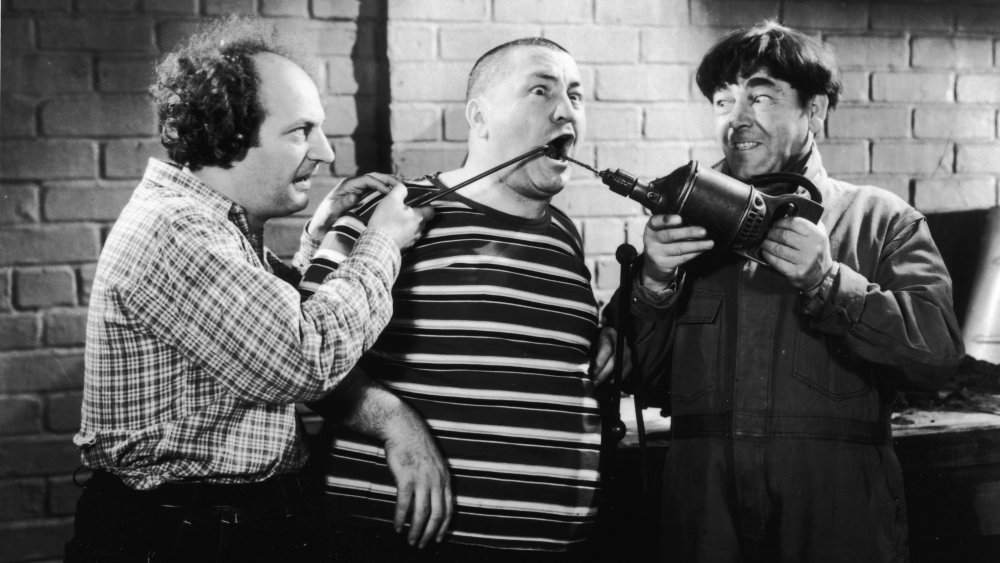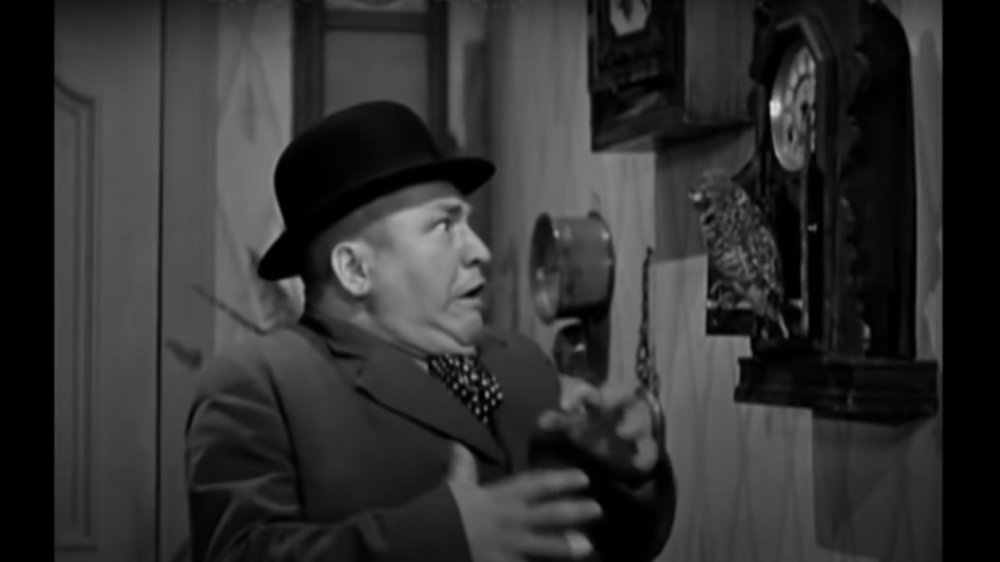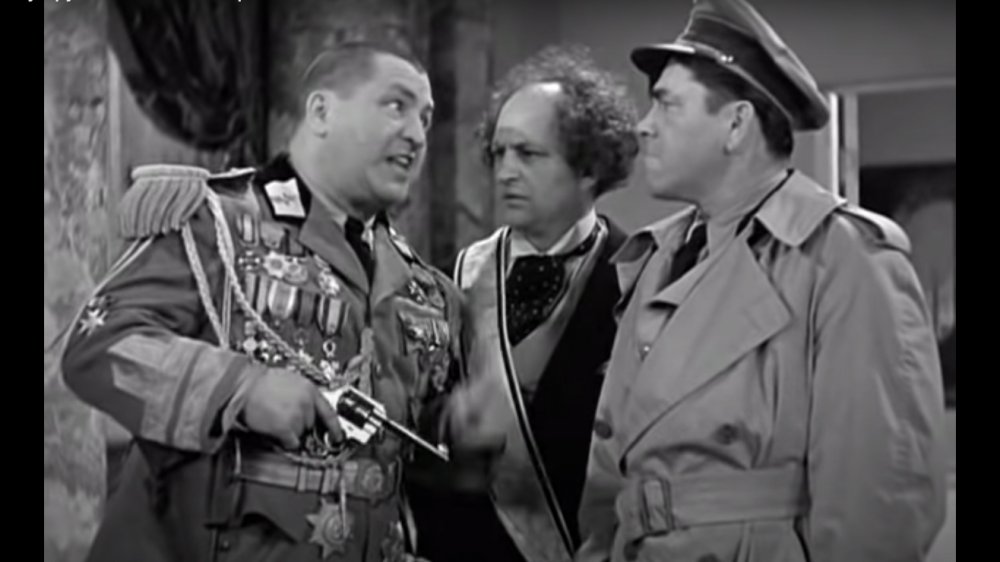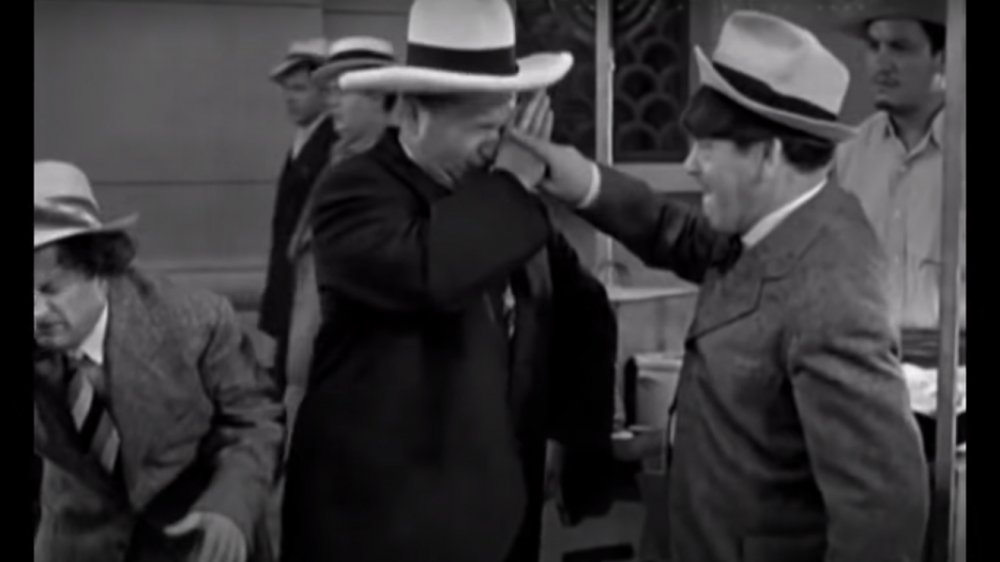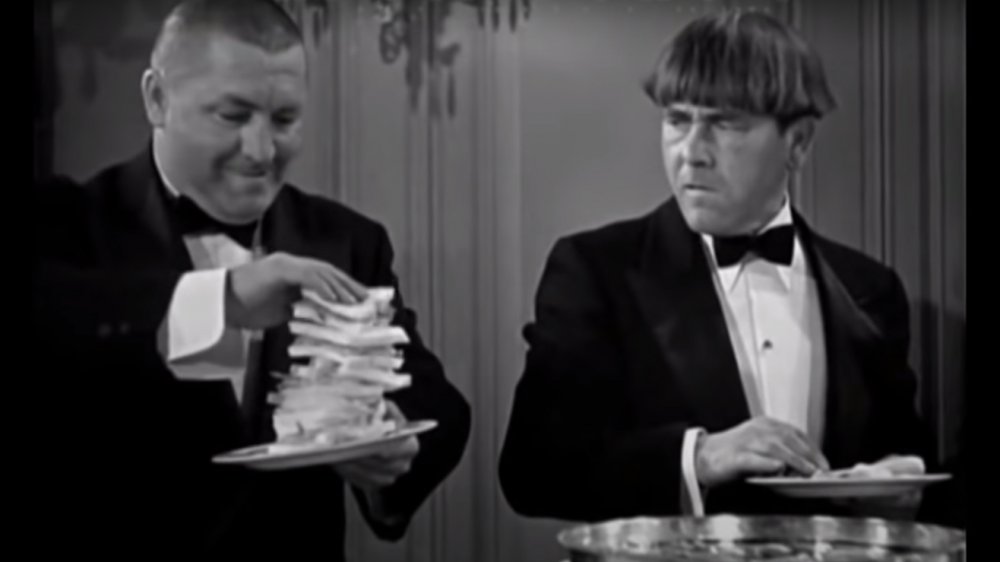The Tragic Real-Life Story Of Curly From The Three Stooges
Once upon a time in this great land of ours, before there was an internet or a television set or even a radio, entertainment came to town live and in person in the form of vaudeville. As PBS explains, mostly it was light entertainment, a bill of acts based on variety. All kinds of performers would try to make their fortune on various circuits — vaudeville houses varied in quality, size of the audience, and how much they'd pay performers — from jugglers, to animal acts, to singers, to dramatic recitations.
Vaudeville would prove a training ground for early mass media entertainers of the early 20th century — Jack Benny, Judy Garland, and the Marx Brothers all played countless gigs, zig-zagging across the country, hoping for Broadway or, later, movies (and then radio and then television and then residuals). One of those acts was "Ted Healy and His Stooges." The act was simple: Healy would try to talk to the audience, being charming and amusing, and he'd be interrupted by a couple of obnoxious simpletons — his "stooges," played by Moses and Samuel Horwitz, later known as Moe and Shemp Howard, according to the official Three Stooges bio page.
Curly was the baby of the family
Larry Fine had been touring vaudeville as a violinist. (He'd also been a boxer, so he knew how to take a punch. Helpful.) Fine, born Louis Feinberg, joined the act as well. By all accounts Healy was at best difficult to work with — an alcoholic ego frequently run amok — and when he decided to go out on his own, the Stooges formed their act — Howard, Fine, and Howard, the Three Lost Soles. When Shemp went solo in the movies, Jerome Horwitz was brought on board. It was fateful.
Jerome was the baby of the family, and his brothers called him "Babe" all his life. By all accounts a quiet child, he wasn't particularly gifted academically, but enjoyed and excelled in athletics, including basketball and ballroom dancing, gifts that contributed to his remarkably comedic agility on film. He walked with a slight limp after an accidental gunshot wound — Moe saved his life by rushing him to the hospital — and that funny exaggerated gait as he walked in character was how he coped. A lemon into very funny lemonade.
He had trouble getting hired at first. Jerome had naturally thick, wavy, dark hair. He was also sporting a luxurious moustache at the time, and Healy thought he simply looked too good to serve as a stooge. Jerome cut off his hair and reported back. Healy sarcastically said Jerome looked "girly," misheard by his brothers as "Curly," and coupled with the irony of the buzz cut, the nickname stuck.
There were political statements by way of slapstick
Moe, Larry, and Curly, billed as The Three Stooges, were early stars of short comedy films, first for Columbia Studios, where they produced some 90 short subjects in the course of 12 years, 1934-46. They made a fortune for Columbia. Their short films were so incredibly popular that the studio head, the infamous Harry Cohn, was able to use them as leverage over exhibitors — book the lousy movies or no Stooge shorts. He also managed to keep the Stooges on a relatively short leash. He forced them to negotiate their contract annually, and while they didn't earn peasant wages, he still made sure they didn't know exactly how valuable they were to the studio. The trio worked 40 weeks out of the year, cranking out at least eight short films — "two-reelers," around 20 minutes each in length. The other 12 weeks of the year they could do as they pleased — spend time with family; tour with their live act. Prominent among their shorts were two films that can only be regarded as a human rights statement. The Stooges, all Jewish, produced You Nazty Spy! (1940) and I'll Never Heil Again (1941), thinly veiled attacks on Hitler's Germany.
No one made slapstick look so easy
Moe managed his money well with investments; Larry tended to spend it as soon as he got it; and Babe/Curly liked a good time. He was reportedly embarrassed by his movie look — the bald head, the portly figure, the child-like behavior — and, an introvert by nature, tried to compensate by dating beautiful women. He had an enormous soft spot for dogs, especially strays. He loved the extravagances that his motion picture income afforded him, and he partied: nightclubs, alcohol, cigars. He was generous to a foolish degree and loved to buy new houses, selling his current property when he fell in love with a new domicile.
Part of the brilliance of his performances came from Curly's trouble learning lines. To cope he'd invent and perform bits of business — the "Woop Woop Woop!" or falling to the floor and pivoting on his shoulder, until he could remember what he was supposed to say without stopping filming.
Just like the rest of us, Curly looked for love and affirmation. He married four times in all, and had two children, both daughters. "We didn't throw the pies; we ate them," as one daughter told the Baltimore Sun.
When Curly became ill, Moe became his caretaker
His lifestyle eventually took its toll. He never drank while he was working, but increasingly would hit nightclubs after the day's filming or performances were finished. He put on weight, especially after the end of his second marriage, and it wasn't long before he was suffering from significant high blood pressure. It finally caught up with him in 1946, when he suffered a brutal stroke on the set of Half-Wits Holiday. Hospitalized for a time, he was finally able to return home for further rehabilitation, and made one final cameo appearance in a Stooges short, Hold That Lion! — Shemp had come back to replace him, and it's the only film in which all three brothers appear together.
His health continued to deteriorate, including more strokes. Curly was moved to a series of care homes. Moe became his caretaker, and refused to institutionalize his brother. As Mental Floss tells us, Jules White, director of You Nazty Spy! and many others, visited Curly in those last days. "Gee Jules," said Curly, "I guess I'll never be able to make the children laugh again." Curly died January 18, 1952, at the age of 48.
